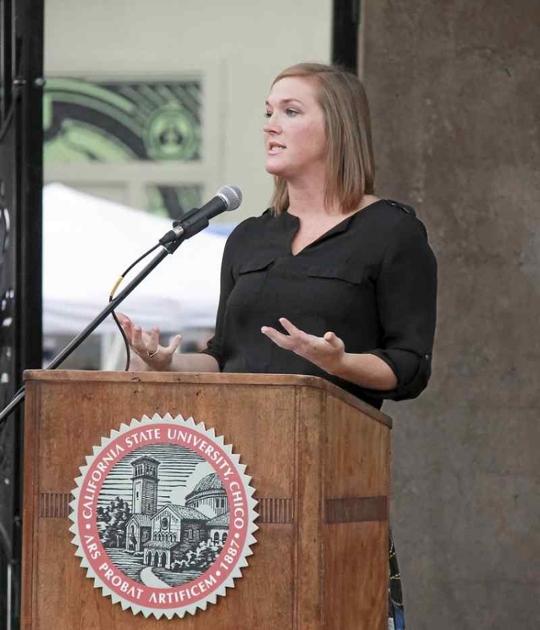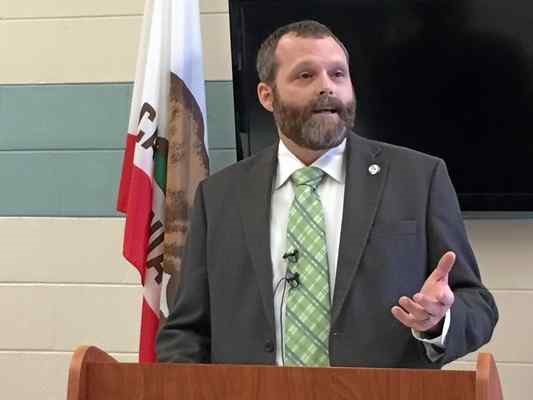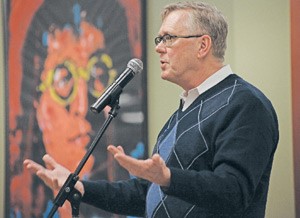Book in Common kickoff event launches community into topic of mercy, justice

Darin Haerle, a political science and criminal justice professor at Chico State University, speaks to a group gathered at City Plaza on Thursday (9/24/2015) for the launching of this year’s Book in Common, “Just Mercy: A Story of Justice and Redemption” by Bryan Stevenson. Each year a book is chosen by a group of Chico State and Butte College faculty members and students. The Book in Common is chosen for its relevancy to contemporary society and is meant to “spark a discussion within the community,” says Jesus Quintana, a Chico State student who helped organize the event. Desiree Stevens closed the ceremony with a soulful rendition of “This Little Light of Mine” as attendees clapped and sang along.
--Copyrighted material, reprinted with permission from the Chico Enterprise Record. Originally published 9/24/15. Available at: http://www.chicoer.com/general-news/20150924/book-in-common-kickoff-event-launches-community-into-topic-of-mercy-justice(opens in new window)
Butte County agencies commended for AB109 response
By Andre Byik, Chico Enterprise-Record

Oroville >> Butte County agencies have done a “commendable” job maintaining services and a stable recidivism rate following the implementation of Assembly Bill 109 despite the expected increase in workload, according to a recently released study.
Criminal offenders under formal probation after the state’s prison realignment bill went into effect in October 2011 were no more likely to be re-arrested than those under supervision before the bill’s implementation, according to the study (PDF) conducted by Chico State University faculty and students.
The report, which was presented at a news conference Wednesday (10/21/15) at the Sheriff’s Office Day Reporting Center, was the result of three years of evaluation of data provided by the Sheriff’s Office, Probation Department and District Attorney’s Office.
Jonathan Caudill, associate professor of criminal justice and an author of the report, said the county’s response to AB109 has been effective in protecting the community.
“The county implemented AB109 with a vision toward public safety, and that’s demonstrated by looking at the data on recidivism for pre and post” AB109, Caudill said.
AB109 has shifted correctional supervision of non-serious, non-violent and non-sexual felony offenders from state prison to county jails, according to the report titled “Navigating the Storm: An Empirical Assessment of the Local Effects of California’s Criminal Justice Realignment.”
But while the county was lauded for its response to the sentencing reform bill, there have been “unanticipated” challenges brought on by the realignment law.
AB109 has been blamed for a 115 percent increase in “failure to appear” charges in the county, which are charges brought on when defendants miss a court date they promised to appear on.
“A defendant’s unwillingness to return to face charges after agreeing to do so delays justice, generates another case, and results in the issuance of a bench warrant,” according to the report. “This leaves prosecutors unable to dispose of cases in a timely fashion...”
Sheriff Kory Honea said the “excessive” number of failure to appear charges demonstrates a need for a “different kind of correctional facility” in Butte County.
A jail is needed that provides a “sufficient amount of space to keep those people who ultimately have demonstrated time and time again that they refuse to come to court and address these problems,” Honea said.
The Butte County Board of Supervisors in August approved Honea’s request to apply for $40 million in state funding to expand the county jail, according to a previous Enterprise-Record report(opens in new window). The expansion would increase the number of beds for inmates, include a medical clinic and offer space for programs like the sheriff’s alternative custody supervision.
The alternative custody supervision program allows some offenders to serve out their sentences under home arrest and was developed in response to AB109.
Steve Bordin, the county’s chief probation officer, said the challenges law enforcement agencies have faced because of AB109 have been “huge.”
“Everybody in Butte County stepped up together and addressed it as a team,” Bordin said, adding, “Realignment brought a profoundly more sophisticated individual for the Probation Department to supervise.”
He credited the Probation Department’s ability to rapidly adjust to the effects of realignment.
“The fact that the recidivism rates are no different than prior to, and the fact that crime has maintained a stable trajectory over this period of time — this is because of the cooperation between of all of our partners,” he said.
The report showed an increase in charges for drug related offenses in the years after AB109 was implemented but a decrease in charges for property offenses.
Researchers found drug possession, resisting or obstructing a peace officer and possession of drug paraphernalia among the top five violations for post-release community supervision offenders. Those were followed by being under the influence of drugs and failure to appear at a work release program.
“We’re not done, and clearly we’re going to have to continue to address both offenders and the underlying cause of criminality,” Honea said, adding, “And their impact on the community both in terms if theft-related crimes and potentially violent crimes as we go forward.”
Download the report at http://tinyurl.com/ButteAB109(opens in new window).
Contact reporter Andre Byik at 896-7760.
--Copyrighted article, reprinted with permission from the Chico Enterprise Record. Available at:http://www.chicoer.com/general-news/20151021/butte-county-agencies-commended-for-ab109-response(opens in new window)
When free speech gets ugly
Expert asks: Is censorship the answer?
By Robert Speer(opens in new window)
robertspeer@newsreview.com
This article was published on 02.04.16(opens in new window).
 Stephen Sherlock, a political-science professor at Chico State with expertise in the Bill of Rights, led a public discussion of political correctness and free speech on Jan. 29. PHOTO BY JOHN DOMOGMA
Stephen Sherlock, a political-science professor at Chico State with expertise in the Bill of Rights, led a public discussion of political correctness and free speech on Jan. 29. PHOTO BY JOHN DOMOGMA
“Along with the freedoms we have come the ugliness and burdens of such freedoms.”
This statement, made several times, was the overarching theme of Stephen Sherlock’s keynote speech at the annual joint meeting of the Chico chapter of the American Civil Liberties Union of Northern California and its partner at Chico State, the Wildcat ACLU.
The meeting, held downstairs in the university’s Bell Memorial Union on Jan. 29, turned out to be mostly a refresher course on free speech—its legal limits and inclusiveness—with a side excursion into freedom of speech in academic settings such as Chico State.
It was delivered against a backdrop of heightened discussion of such matters as whether political correctness has run amok in an effort to protect students—ethnic minorities and women in particular—from what is called “microaggression,” or casual, unintentional racism or sexism. It was this issue that occasioned the liveliest discussion of the evening.
Sherlock is a political-science professor at the university with expertise in the Bill of Rights. He spent the bulk of his lecture talking about the legal limits to freedom of speech, such as obscenity, defamation and dangerous words (likely to lead to lawlessness). He noted that the Constitution protects only against government censorship, and that freedom of speech can be limited in terms of time, place and manner.
An example: Noting that Chico State once had a designated “Free Speech Area,” Sherlock said it was the university’s right to prohibit a rally there if the lawn was being mowed at the time.
Another example: If you burn a cross on your neighbor’s lawn, it’s a violation. If you burn a cross somewhere in the mountains, where nobody else can see it, it may be ugly, but it’s perfectly legal.
“There is a constant tension between cultural values and free speech,” Sherlock said. “It’s a given.”
The rules regarding free speech apply on campus. “Public universities are supposed to be about the open, robust exchange of ideas,” Sherlock insisted. “That sometimes involves stepping out of your comfort zone.”
He pointed out that Janet Napolitano, president of the University of California system, and a former secretary of Homeland Security under President Obama, last year asked all deans and department chairs to attend classes to overcome their biases toward minorities and women and learn how to avoid microaggressions. Attendance was voluntary, but Napolitano was to be given a list of attendees. This potential threat to people’s jobs, Sherlock said, could have a “chilling effect” on speech.
A fellow political-science professor in the audience, Michael Coyle, defended students’ sensitivity to microaggressions. They’re the product of real grievances, a “rising up” of students responding to white privilege and blindness, he charged.
Microagression is usually the product of ignorance and insensitivity. Some examples, from a piece on BuzzFeed: “So what do you guys speak in Japan? Asian?” Asked of a black woman: “Why do you sound white?” Asked of a Latina: “You don’t speak Spanish?”
“Where do you draw the line?” Sherlock asked in response. “Is censoring speech the way to do it? Speech isn’t the problem; bigotry is the problem. Censorship just breeds resentment.”
Don’t take your freedoms for granted, he urged. He pointed out that whoever is elected president this year will almost certainly be able to appoint two or more justices to the Supreme Court, which potentially could tilt the court even further to the right than it went in the Citizens United case.
“I grew up with this idea that once we had these rights, they’d be there forever,” he said, “but that’s not necessarily true.”
Reprinted courtesy of the Chico News & Review, www.newsreview.com/chico(opens in new window)
Professor Emeritus Michele Shover and Arlene Clements Ward presented, “The California India Wars: Chico Front in the 1850s” at the Chico Museum on September 26, 2015. The lecture was based, in part, on Professor Shover’s forthcoming book, “Standoff: Farmers, Indians and Miners at War, 1850-1865”. Look for more information on this book in the next newsletter.
This year’s Book in Common, “Just Mercy: A Story of Justice and Redemption” provided several opportunities for our faculty to share their expertise. On October 26, 2015, Political Science and Criminal Justice faculty, Jon Caudill, Darin Haerle, Sarah Smith, Michael Coyle, Doris Schartmueller and Alan Gibson participated in a panel discussion around the Book in Common. Among other topics, the panel touched on youth sentencing, patriarchy in punishment and the US Supreme Court’s major sentencing decisions. If you missed the panel, a video of the presentation can be accessed at: http://rce.csuchico.edu/professional-development/connect-learn-engage/forums/political-science(opens in new window)
NPR’s Morning Edition featured our own Diana Dwyre on January 7, in their story on the role of Super PACs in this presidential election. If you didn’t catch it, you can hear or read the story at: http://www.npr.org/2016/01/07/462211790/superpacs-are-not-so-super-in-2016(opens in new window)
